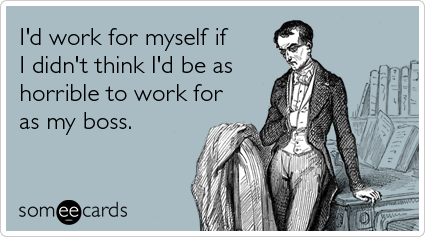This guest article is from Caleb Vognsen, a builder, gamer, and thinker. For more on Caleb, read to the bottom.
Bossless is bunk.
Perhaps you’ve heard of this “Bosslessness,” the latest pre-existing corporate substructure The Internet has now decided is trending. Perhaps you’ve heard it mostly involves de-titling everyone, then allowing intra-office relative strengths to organically emerge around compelling projects. And perhaps you’ve heard it’s profitable.
I call Shenanigans. “Bosslessness” is just a terminological shift that allows companies to convince themselves they’re not stifling innovation with sluggish bureaucracy. Do you remember the implementation of Casual Fridays? At least back then, something — your inseam, maybe — actually changed. “Going Bossless” is the equivalent of declaring a Casual Friday, then forcing everyone to go Full Victorian Steampunk, while telling them to RELAX.
Look, the most difficult thing about organizing anything, companies included, is figuring out who’s in charge. It doesn’t always have to be the same person, for the same amount of time, and they don’t always have to be in charge of everything at once. But they have to be.
At least, they do if you want to do well. Projects and companies profit more, after a certain saturation point, from a good boss than from another good worker. Professors Lazear, Shaw, and Stanton found in a 2011 study that bosses — essentially, people in charge of managing people — have outsized effects on their company’s productivity. Apparently, replacing a bad boss with a good one is worth more than adding another worker; a good boss makes good workers even better; and even a bad boss produces more, in direct proportion to their compensation, than a worker.
Even the “bossless” companies know this. That’s why, even when they don’t have people with boss-y titles, they have boss-y people. That’s why they have compensation schemes designed around rewarding successful boss-ing. That’s why their company handbooks are primarily focused on making sure you know that, since there are no “bosses,” you’re supposed to figure out how to “boss” yourself – to “effectively create a job description that fits the group’s goals…[and] provide a shared understanding of what to expect from each other.”
Sounds like when there are no bosses, you’re the boss. So when you show up to Valve, or to Github, or to Gore, you’re going to serve somebody. Or you’re going to be that somebody. Or you’re going to be a combination of both, nimbly, as the day goes on. Just like the rest of us.
A few people have been skeptical about this stuff. They’ve raised concerns about decreased motivation, the relative suckiness of group decision-making, calculating compensation, and the general difficulty of fitting the concept into a preexisting company that hasn’t grown it from the start. But these criticisms miss the point. Essentially, they’re just attacking the logistical challenges that accompany any organizational shift — changes in payroll, culture, etc. All they’re saying, ultimately, is “bosslessness can’t work because companies can’t work hard enough to make it work.” That’s silly. Plenty of companies have.
These critics aren’t saying “bosslessness can’t work because bosslessness doesn’t exist.” And that’s what I’m saying. “Bossless” is just the hip new jargon companies have invented to explain how they invert the troubles of managing a company hierarchy. Their bosses emerge from within their culture, instead of descending into it — and, at least for a few companies like Valve, being bossless is far less troublesome.
The Trouble with Bosses
When your company has bosses, it’s committed to a hierarchy of intention — a smaller group of people has a large amount of control over a larger group of people and their smallest actions. Your company’s productivity flows downwards. From a good boss comes good ideas (even if they’ve received them from somewhere else along the chain), followed by good planning, ending in good management of good execution.
Everyone has experienced the problem here. Today’s market is mercurial; windows for corrective adjustments and competitive advantages get smaller as their implementations get faster. If only a few people at a company are “bosses,” there’s an increasingly greater chance that the ever-expanding scope of modern business challenges will outgrow their expertise. And a “boss,” almost by definition, is not supposed to have a challenge exceed their expertise.
From this tension a company will strain. Bosses will resist new challenges, stunting company growth; they will shut down vertical communication, not wanting to risk exposing inexpertise. As Valve correctly summarizes in their Employee Handbook, “[boss] structures inevitably begin to serve their own needs rather than those of [our] customers.”
The Trouble with Bossless
When a company is bossless, it’s committed instead to a hierarchy of invention — a larger group of actions have small amounts of control over the company’s people. Valve’s workers vote with their wheels, and its productivity flows outwards — from a good idea, to a good project, encircled by good workers.
The problem here is less obvious. Think herding cats, but harder; like herding cats without a herder.
Today’s workers are, allegedly, mercurial: the half-life of an software engineer is bending towards that of an undersized NFL running back. Companies fizzle, explode, contract, leaving noxious gasses and labor forces behind. With no one “in charge,” there’s an increasing chance that the stresses pulling away at workers will shred their morale and direction; there will be no incentive beyond the immoral, and no hazards, including the moral.
Did those problems sound different from each other there for a second? Sorry, I got stuck in corporate rhyme-speak. They are just mirror images of one another.
Again, everyone knows a bad boss is bad primarily because “badness” is what only the boss is allowed to assess. It follows that a company with bosses risks losing its edge, not just because it has bosses, but because their bosses are not actively growing their skillset; not actively seeking out comments and criticism up and down the line; not actively assessing and improving their own worth.
But replace “bosses” with “coworkers” and voila! All of a sudden you might as well be quoting from Valve’s Handbook again:
- We all need feedback about our peformance…to provide information that will help [us] grow.
- You were hired to constantly be looking around for the most valuable work you could be doing.
- If you’re thinking to yourself, ‘Wow, that sounds like a lot of responsibility,’ you’re right.
Valve and other bossless companies have simply inverted the HR/staffing challenge, from “find a capable manager who can master this business” to “find a master businessman who can develop capable management.” It’s why hiring, as they note, is “the single most important thing you will ever do at Valve.” After all, it’s hard to coherently list “openness” and “tenacious self-assessment” alongside “proficient in Unity and C++” on a resume.
A Change in Culture, Not Process
I get it, though. Companies, like people, love to look lean. Any excess is waste; in the wake of exhaustive and increasingly sleek new technologies like iDoneThis which are designed for a hierarchy of invention and to help individuals in a workforce optimize and manage themselves, and after Webpocalypse 1.0 [b. 1997 – d. 2000] dissociated an office’s performance from its appearance, it’s increasingly difficult to justify a labyrinthine corporate substructure.
But there’s really no obvious evidence that companies without titled bosses perform tasks any differently than those with them. In either instance, value/production/sales opportunities (or deficiencies) are discovered, workers capable of addressing them convene, solutions are floated, and the best are adopted. Even strategies for optimizing the performance of those tasks in a bossless company don’t sound all that new – increase communication! increase accountability!.
These companies and their approaches haven’t changed, nor have their incentives or ultimately their mid-project behavior. If anything, most of these bossless companies seem to be doing to hierarchy what has already been done by globalization to supply management — extract the values and optimalities a boss brings (overarching vision, daily motivation, general/vertical competency) and discard the old-world husk of elitist baggage (unnecessary reverence, communication/culture gaps, sluggish adaptation).
But it’s not clear that “bossy” companies always have — or have had — that baggage.
Ultimately, “bossless” just sounds like a long position on social dynamics. Valve et al are betting they can find more talented people who are good at being bossless — good at constantly reexamining their contributions to and developments in a company — than they can talented people who are good at being bossed — good at taking direction, and gradually learning how to give it. They’re betting they can draw bosses from inside their culture, instead of down into it. They’re betting they can make “a place where incredibly talented individuals are empowered to put their best work into the hands of millions of people, with very little in their way.”
And that’s a fine bet. But don’t call it a “bossless” one.




